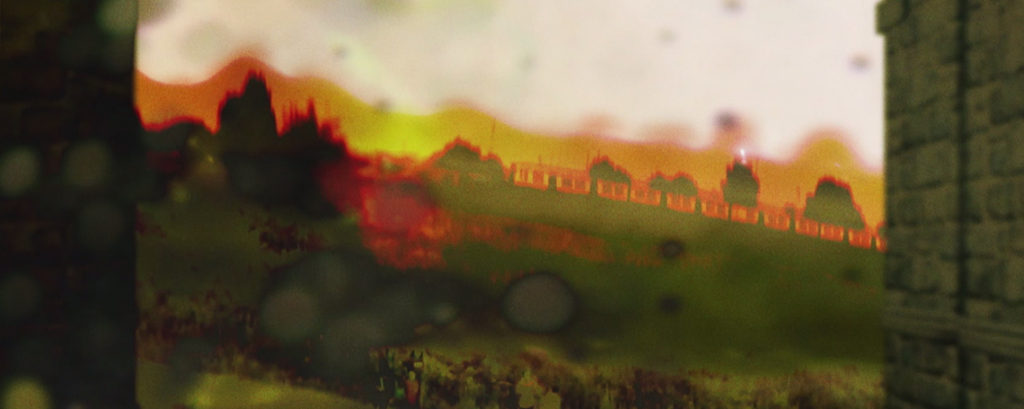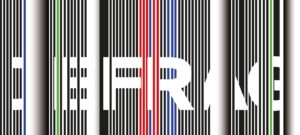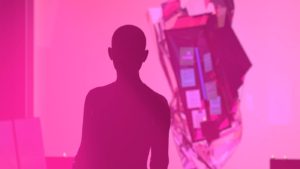As the world intertwines, bending over upon itself, novelty emerges in the hem and haw of its creases, overlapping geographic and technological. Similarly, the music of Dane Law —a software patch and current alias of producer and engineer Adam Parkinson —sounds with instability; it bends, layers and corrugates, in turn producing more lines to fold. “I like the way sounds encounter technologies”, says Parkinson speaking through Skype from his home in London, “putting them in different contexts, re-contextualising. It’s this meeting between you, the sound and the technology”. Parkinson’s work represents hinged landscapes, contingent on pivotal factors that also manifest sonically and visually, and in his mix for aqnb, where each track is derived from Brood Ma’s P O P U L O U S and aptly retitled D E P O P U L O U S (after Brood Ma).
Following the release of United in Dance on Quantum Natives on April 11, along with an accompanying video for its title track, a more accessible version of the Dane Law patch is set for release, allowing people to “use it and create christmas number ones” with it, jokes Parkinson. In conversation, the more serious question of occupation returns frequently, be it work, as a means of earning (and affording) a living, engagement in activity, or possession or settlement and the control of an area —in a world where geography is bound up with software, the latter is still a fickle issue.
Parkinson grew up in Saddleworth, Greater Manchester, a largely rural area with its own contested history, long described as a part of Yorkshire where Lancastrians lived. “I really miss the landscape”, he says, “I think I first got into electronic music walking around the moors. A lot of electronic music is really pastoral. As well as having all these roots in dance floors and moving bodies, there’s an almost rural feel to a lot of it as well”. The area happens to be part of what was once Danelaw, from which Parkinson takes his moniker, “a historical name given to the part of England in which the laws of the Danes held sway and dominated those of the Anglo-Saxons”.
On the other hand, in the midst of a constantly changing geo-social and geopolitical landscape, Parkinson also talks moving to London, gentrification, the introduction of cafe culture in Saddleworth (“now you can get an espresso, a beef rag pudding and a pint of ale on the same high street”), the effects of a Tory government, and the death of rave culture in the UK —at the core, accidents that typify real outcomes, pointing toward different systems and relations. These subjects are also referenced in adjacent visual output, courtesy of Quantum Natives and Werkflow, adopting imagery from The Prodigy about the criminal justice act and free party scene, through to logos of 90s free party sound system Spiral Tribe, and neural network/deep dream technology.
Likewise, novelty emerges in the music of Dane Law through essential accidents, informed by a background in improvised music, a preoccupation with the sounds of eminent IDM duo Autechre and the thinking of philosopher Gilles Deleuze —an “aesthetic of failure” and the idea of repeating errors, mutations or glitches, until they make sense. The software is “a nice environment because you can make mistakes in it”, says Parkinson. “Often I realise it makes things sound interesting because I’ve done it wrong, and when I try to fix it it doesn’t sound good anymore”. Indeed, while new geographies and new technologies produces new accidents, new realities also arise in the reverse.
** Can you tell me a bit about the software?
Adam Parkinson: It’s written in Pure Data, which is a visual programming language. It’s like programming watered down for people like me. There’s a granular sampler in it that I think was originally written by Nobuyasu Sakonda and then rewritten by Bill Orcutt from Harry Pussy. The software that I’ve written is an amalgamation of other people’s work.
It’s kind of evolving. The process of writing and working on it and making music with it is all bound up together. Sometimes it does its own thing and you interact with it, which is a nice way to play an instrument. It’s sort of a two-way dialogue, being engaged in an interaction with the machine.
** Is there any relation to Danelaw itself?
AP: I quite liked [the name Dane Law] because it sounds like it might be a euro house producer. I was really annoyed by UKIP and Tory arguments about British identity. I realised that I didn’t know that much about the history of England and was interested in unpicking it. Then I came across Danelaw, of part of England being Viking —half of the country was given over and it was sort of a unity and disunity at the same time —and found that kind of fascinating. I realised that all of these ideas of Britishness are totally contingent and made up, and the idea that we’re an isolated island that has its own culture is complete bullshit. Immigration and invasion over the years is what created England, in a good way.
** Do you find that issues of control and contingency also manifest in the sonic material?
AP: I like the way sounds encounter technologies. You have a bit of control over the technology but it’s this meeting between you, the sound and the technology. [I like] putting sounds in different contexts, re-contextualising, which is nothing new and people have been doing it for years. I first got into techno, not through dancing, but when I had to finish a dissertation and was listening to loads of Jeff Mills in the library. You realise that music, or sound, put in a different context works in a different way. The software is an extension of that. It’s a way of trying to re-contextualise sounds.
**…and in the visuals?
AP: In the same way that I’ve been interested in putting sounds in different contexts, I feel like Quantum Natives and Werkflow added this layer of meaning and interpretation through the video and the visuals. You can see in the video and artwork there are all these references to gentrification and the death of rave culture in the UK. The way they have framed the album is really interesting and makes you listen to it in a different way too, maybe.

** How was your experience of moving to London?
AP: I’ve been living in London for nearly four years and even in those four years it’s changed a lot and London is just becoming a playground for the rich, the way that rent is working.
** [the Skype feed glitches] The connection here’s a bit…
AP: …that sounded like Autechre then.
I remember spending years and years trying to achieve those sounds that I’d hear in Autechre, with a crappy sampler or not knowing how to do it or how to get anywhere near those sounds. I’ve just been spending my whole life trying to rip Autechre off actually, on reflection [laughs].
** I guess you can achieve interesting results when you try to copy something without access to the same tools…
AP: I think that’s how new stuff is created, almost by mistake. Novelty is born out of the failed copy, isn’t it. I got a bit too much into Deleuze at one point. I was into that idea of, almost the parallels between the genetic level of the mutation leading to novelty, and the same thing in music, the failed copy actually creating novelty.
I spent years and years trying to recreate what I thought was fashionable music from London and just failing, but unfortunately none of those failed copies resulted in novelty or beauty [laughs].
** Is Dane Law also an extension of this?
AP: Definitely at the heart of Dane Law is the idea of sampling being a way of seeing what other qualities a sound can reveal, through putting it through the software.
Trying to remix Brood Ma’s P O P U L O U S album is, in a way, my attempt to pay homage to what I think is a really nice album. I wonder if it’s a little bit like looking after someone’s cat but trying to genetically splice it with something else and returning it with an extra leg.**
Dane Law’s United in Dance was released free-to-download via Quantum Natives on April 11 and ‘The Danelaw’ (QNAPP001) app is out June 6, 2016.
Header image: Courtesy Quantum Natives.
TRACK LISTING:
0:00 ESTEEM (DEIRAN REFIX)
3:10 FORTRAN (MERCIAN REFIX)
5:20 IBEAM (KENTISH REFIX)
7:30 FERITE CORE (MAGONSÆTE REFIX)
9:15 NRG JYNX (BERNICIA REFIX)
9:30 EMJ-12 (WESSEX REFIX)
11:00 RUBBEL BODY (TOMSÆTE REFIX)
14:40 MONACO (SOUTH SAXON REFIX)
Every track in the mix is made solely from a track on Brood Ma’s P O P U L O U S album, which was released in 2014 on Quantum Natives and later reissued by Hemlock Recordings.















